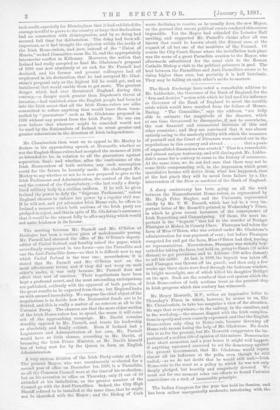The meeting between Mr. Parnell and Mr. O'Brien at Boulogne
has been a curious piece of melodramatic posing. Mr. Parnell had stormed the office of Mr. O'Brien's deputy- editor of United Ireland, and forcibly seized the paper, which accordingly reappeared in two forms—one the Parnellite and one the Anti-Parnellite form—so that it is difficult now to say which United Ireland is the true one ; nevertheless, it is stated that Mr. Parnell and Mr. O'Brien met on the most affectionate terms, and if they did not weep on each other's necks, it was only because Mr. Parnell does not affect that sort of emotion. Their negotiations have been kept a profound secret, and the most astounding anticipations are published, evidently with the approval of both parties, of the great results to be expected from them ; but England looks on with amused incredulity. We suppose the chief object of the negotiations is to decide how the Nationalist funds are to be divided, and this is really a matter of no concern at all to the Unionist Party. The chances are that the more either section of the Irish Home-rulers has to spend, the worse it will come out of the approaching campaign. Mr. Davitt remains sturdily opposed to Mr. Parnell, and treats his leadership as absolutely and finally extinct. Even if Ireland had a Legislature and Administration of her own, Mr. Parnell would have as little chance, according to Mr. Davitt, of becoming the Irish Prime Minister, as Mr. Devitt himself has of being sent for by the Queen to form an English Administration.














































 Previous page
Previous page